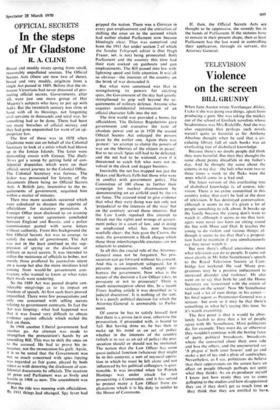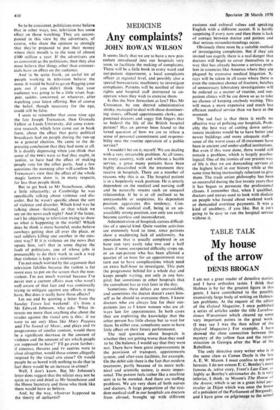TELEVISION
Violence on the screen
BILL GRUNDY
When Jane Austen wrote Northanger Abbey, I take it she was doing two things, apart from producing a gem. She was taking the mickey out of the school of Gothick novelists whose headmistress was Mrs Radcliffe. And she was also suggesting that perhaps such novels weren't quite as harmful as Sir Anthony Absolute thought when he said that a cir- culating library full of such books was an everlasting tree of diabolical knowledge.
-Because there's no doubt people did think they were harmful. But then they thought the same about penny dreadfuls in my father's day. And he thought the same about the cinema in my day—the lads who went two or three times a week to the flicks were the ones who'd come to a bad end.
The latest version of this everlasting tree of diabolical knowledge is, of course, tele- vision. There is no crime committed in this country today that can't be laid at the door of television. It has destroyed conversation; although it seems to me it's given a lot of people something to talk about. It breaks up the family because the young don't want to watch it; although it seems to me that teen- agers were never too keen on sitting round the fire with Mum and Dad. It teaches the young to do violent and vicious things; al- though it seems to me that that's a proposi- tion hard to maintain if you simultaneously say they never watch it.
But now there's official uneasiness about what television can do to people. It came out most clearly in Mr John Stonehouse's speech to the Royal Television Society at Cam- bridge last weekend. He said 'Many pro- grammes may be a positive inducement to increased disorder and violence'. He also went on to say that both he and the Home Secretary are 'concerned with the extent of violence on the screen'. Now Mr Stonehouse had said a lot of rum things in his career— his final report as Postmaster-General was a scream—but even so it may be that there's something in what he's saying this time. So it's worth examining.
The first point is that it would be abso- lutely foolish to deny that a lot of people . agree with Mr Stonehouse. Most politicians do, for example. They must do, or otherwise they wouldn't continue with the boring farce of party political broadcasts. broadcasts where the converted cheer their own side and boa the others. and the unconverted say 'A plague o' both your houses' and go and make a pot of tea and a plate of sandwiches. Nevertheless, as I say, politicians do believe that their appearances on the screen have an effect on people (though perhaps not quite what they think). As an ex-producer myself
I know just how ready they are to come galloping to the studios and how disappointed they are if they don't get as much time as they think that they are entitled to have.
So to be consistent, politicians must believe that in other ways, too, television has some effect on those watching. They are accom- panied in this view by the advertisers, of course, who share the opinion so strongly that they're prepared to put their money where their mouth is to the tune of almost f100 million a year. If the advertisers are as consistent as the politicians, then they also must believe that things other than commer- cials have an effect on the audience.
And to be quite frank, an awful lot of people working in television believe the same. It would be hard to go on flogging your guts out if you didn't think that your audience was going to be a little wiser, hap- pier, sadder, concerned, or whatever, after watching your latest offering. But of course the belief, though necessary for the ego, could still be false.
I seem to remember that some time ago the late Joseph Trenaman, then Granada Fellow at Leeds University, did some exten- sive research, which later came out in book form, about the effect that party political broadcasts had on people during the run-up to a general election. He came to the de- pressing conclusion that they had none at all. It is doubly depressing when you think that some of the rev's were so bad they ought, in justice, to have had the effect of making people vote for the other party. And a few questions the morning after will confirm Mr Trenaman's view that the effect of the whole magic lantern show is, in many respects, far less than people think.
But to get back to Mr Stonehouse, albeit a little reluctantly; at Cambridge he was specifically talking about violence and dis- order. But he wasn't specific about the sort of violence and disorder. Which kind was he talking about—fictional, or that which we see on the news each night? And if the latter, isn't he objecting to television trying to show us what is happening in the world? Which does he think is more harmful, make-believe cowboys getting shot all over the place, or real soldiers killing one another in the mes- siest way? If it is violence on the news that upsets him, isn't that in some degree the fault of politicians, one of whose jobs is presumably to do their work in such a way that violence is kept to a minimum?
I'm not much worried by the argument that television falsifies because the violent is far more easy to put on the screen than the non- violent. I'm not much worried because I've never met a current affairs man who wasn't well aware of that fact and was continually trying to mitigate against any effects it may have. But does it really have those effects?
Let me end by quoting a letter from the Sunday Times last weekend : it's from a Mr Edward Johnson, who asks 'What in- terests me more than anything else about the tirades against the visual arts is this: if we were to see only films like Mary Poppins and The Sound of Music, and plays and Tv programmes of similar content, would there be a significant decrease in the amount of violence and the amount of sex which people are supposed to have?' I'll go even farther: if cinemas, theatres and TV centres were to close altogether, would those crimes allegedly inspired by the visual arts cease? Or would people be so bored with nothing to do that in fait there would be an increase in crime?
Well, I don't know. But Mr Johnson's letter does suggest that the Matter may not be quite so cut and dried as Mr Stonehouse and the Home Secretary and those who think like them would have us believe.
And, by the way, whatever happened to the theory of catharsis?



































 Previous page
Previous page